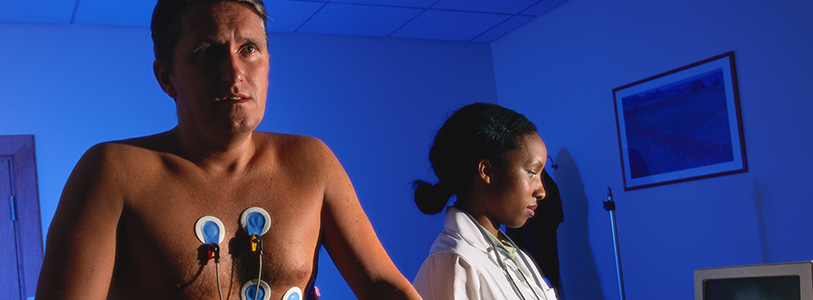Doctors Urge Symptomatic Patients to Get a Heart Check, Stress Test

Most people think of chest pain as a classic heart attack symptom but what if there were earlier signs in the days, months and even years leading up to a heart attack? Researchers have in fact studied the early warning signs of an impending heart attack. The findings are surprising and do not always appear in the areas of the heart, as might be suspected.
Paying close attention to your body could prevent a heart attack. If you experience any of these unusual symptoms, head to your doctor for a heart check.
Early Warning Signs
- Chest pain or pressure
- Shortness of breath
- Nausea, indigestion or fullness
- Pain in the jaw or arms
- Fatigue
- Anxiety
- Upper back pain
It is important to remember that symptoms vary widely among men and women. “While men often experience classic chest pain, women may experience atypical symptoms, such as shortness of breath or back pain. In general, symptoms that are brought on by exertion and relieved by rest may indicate heart trouble,” said Dr. Mark Apfelbaum, Associate Professor of Clinical Medicine at Columbia University College of Physicians and Surgeons and Director of the NewYork-Presbyterian Cardiac Catheterization Laboratory and NewYork-Presbyterian Lawrence Hospital.
In addition, many of the early warning signs for a heart attack mimic other conditions. “For example, nausea is commonly associated with gastrointestinal upset, but nausea that occurs primarily when walking up a hill is very different from nausea that occurs after eating,” explained Dr. Apfelbaum. Because women often experience atypical heart attack warning signs, it is especially important for women with suspected heart trouble to visit a doctor.
Specifically, patients should consider heading to a cardiologist and possibly undergoing cardiac catheterization — minimally invasive procedures to visualize the arteries of the heart, check blood flow and pressure, and evaluate the efficiency of the heart valve.
“Men or women who have early signs or symptoms of a heart attack can first undergo a simple, noninvasive stress test. This can be a lifesaving technique and help guide proper treatment,” said Dr. Apfelbaum.
A typical stress test involves the patient exercising on a treadmill while being hooked up to an electrocardiogram (EKG). Doctors assess how the heart responds to exercise by slowly increasing the treadmill’s speed and incline. Most stress tests also measure heart activity with ultrasound images or nuclear scans of the heart. For patients who are unable to exercise for medical reasons, doctors can simulate exercise to the heart by administering medications through an IV.
If findings suggest that there is diminished blood flow to the heart, doctors can perform an angiogram and take pictures of the arteries that supply blood to the heart muscle. “If something significant is found, more often than not we can correct the problem on the spot during the angiogram procedure. We can fix blockages to the heart by performing angioplasty with balloons and stents, making the patient feel better and ideally preventing a heart attack,” said Dr. Apfelbaum.
“If cardiac catheterization images reveal multiple blockages or if there is a high-risk of complications, we may determine that angioplasty is not the best course of action. Sometimes stenting is the right treatment and sometimes it is surgery. If it is not an emergency, we take a step back and go over all the options with the patient and come up with a great game plan,” he said.
Dr. Apfelbaum and colleagues at NewYork-Presbyterian/Columbia University’s Interventional Cardiology Program routinely perform more than 10,000 cardiac catheterization procedures per year, and arguably, it’s the most experienced interventional program in the nation. And now, patients in Westchester and the lower Hudson Valley have access to many of these services close to home at the NewYork-Presbyterian Cardiac Catheterization Lab at NYP/Lawrence Hospital. Under the direction of Dr. Apfelbaum, and staffed by Interventional Cardiologists and Electrophysiologists from Columbia University Medical Center, the lab performs emergency cardiac angioplasty for patients having a heart attack, and other elective procedures. The lab will offer diagnostic tests, such as angiography, right heart catheterizations, heart biopsies and routine, non-invasive cardiac imaging. Both emergency and elective procedures are performed including angioplasty and stenting to improve blood flow. The Cath Lab will also offer treatment for arrhythmias by implanting pacemakers and defibrillators.
Doctors urge patients with early warning symptoms to come in for a heart check. If you think you are having a heart attack, do not wait—call 911. Do not attempt to drive to the hospital yourself and risk losing precious minutes because early diagnosis and treatment saves lives.
To find a cardiologist, visit nyp.org/find-a-doctor or call 877-697-9355.




